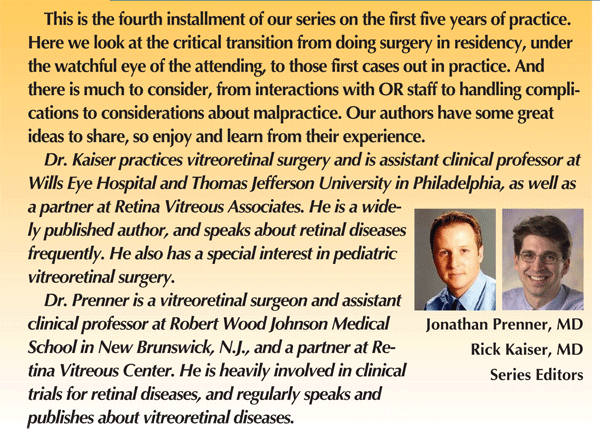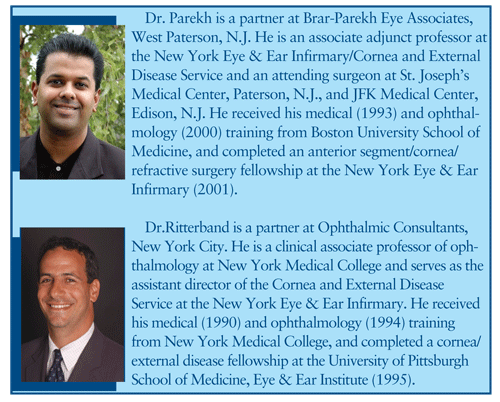

As a surgeon stepping out of residency or fellowship and into private practice, you face a new world in terms of operating environment, interpersonal dynamics and expectations. These changes present themselves just as you enter the operating room "all alone," virtually for the first time.
It can be unsettling for a young surgeon, but you can find confidence in an obvious source. Surgically speaking, you are well-prepared, thanks to the many hours you spent in the OR during your last year of training.
This doesn't mean you are the best surgeon you will ever be, as experience provides a type of skill set and knowledge you cannot acquire by any other means. Over time you will gain insight and efficiency that will refine your overall surgical performance.
But at this moment, your knowledge and skills have been honed by highly accomplished mentors. You are ready to provide surgical care to patients.
Your challenges now are to fashion a logical transition in the OR, to establish a positive rapport with OR staff, and to earn the trust and respect of surgeons and patients alike.
Start with the Patient
It's best to start where it all begins, with the patient. As the youngest surgeon in the practice, there will be skepticism toward you. Perhaps the patient would have preferred a senior doctor, but has been directed to you because you have openings in your surgical schedule.
To allay any concerns about being "young and brash," always show courtesy and conservatism. Introduce yourself to the patient and family member, and take some time to get to know them. Tell them something about yourself, including where you received your medical and surgical training.
You have time on your side. Your schedule is not as full as the other surgeons', so carefully explain the patient's condition and surgical options. Give a sound medical reason for all your decisions. Show the patient and family that you are a good doctor and a good communicator.
When it's time to obtain informed consent, do not delegate this duty to the surgical coordinator. This is an opportunity for you to solidify your relationship with the patient. Both of us still handle informed consent ourselves, and consider doing so the gold standard for surgeons.
Here are some tips:
• Create a clear explanation of the surgical process that you can use every time you explain that surgery.
• If there is any language barrier, have a family member or another translator in the room with you.
• Use body language that projects confidence. Directly face the patient, nod and smile when appropriate, use a pen to gently direct the patient's gaze.
• Have a dry erase board or clip-board to draw pictures as you explain the surgery. Even if a patient does not understand your words, he will understand the pictures.
• Discuss possible complications and use pictures in the same way.
• Gauge the sophistication of the patient by the questions she asks. Adjust the level of your language and detail to the patient's ability to understand.
• Probe to make sure you have heard and answered all questions. Encourage the more timid personalities to speak candidly.
• Document the conversation in the chart. Ask the patient to sign the chart as well as the consent form (see "Medical Malpractice Litigation: Ten Things They Didn't Tell You").
Senior Doctors and Staff
Although you have interacted with senior doctors and OR staff members throughout your training, the relationships differ in private practice.
Senior doctors who are your employers or new partners want to see you as an asset, which means they don't want to see a change in the momentum of practice. Avoid any behavior (with anyone) that could be interpreted as audacious, rude or brash.
Plan surgeries carefully and operate conservatively so you avoid bad surgical events. Of course, complications are inevitable (more about that below), but do not allow carelessness to be the cause.
Discuss any complications candidly with senior surgeons, and seek their help with difficult cases. Ask to observe their surgeries, and watch them intently. There are many different ways to remove a cataract; watch their techniques and ask questions. Pick their brains, and show that you respect them.
The OR staff is likely to differ from what you experienced in residency, where OR personnel usually are not specifically trained for eye surgery (the exception will be at large eye hospitals or surgical centers). Remember that the nurses you will work with have done thousands more cases than you; they are efficient and good.
In residency, the OR staff looked to the attending surgeon for leadership. Now, they will look to you. You don't need to tell them how to do their job, but they will want to know how you want the patient and scope positioned, instruments set up, safety issues and other things you didn't have to think about in residency.
The best way to build rapport is to show respect for the staff. Introduce yourself and ask every person's name (after a few surgeries together, you should know their names). Take an interest in them as people, and they will appreciate it.
Two other very important tips:
• Never raise your voice or lose your cool.
• Always say thank you.
Surgical Transition
To start, be cautious about scheduling too many surgeries. Your goals are to do a good job on each surgery without complications, and to represent the practice well. That means taking your time with each surgery; never give the impression you are rushing.
It's a good idea to ask a senior partner to be present for the first five to 10 cases. You may not need his assistance, but it's helpful to have the presence of a surgeon who knows the lay of the land.
When scheduling surgery, you are the junior doctor, so you will not get the preferred OR slots. Be prepared to be operating in the afternoon and on Fridays, necessitating a Saturday check on postops.
Initially, you should book standard cases, avoiding, for example, a complex white cataract with a Flomax pupil. Also, if you have a choice, do your first cases in a hospital OR rather than an ASC, as the hospital is going to be similar to your residency experience.
Even so, you will find yourself in a different OR environment, including the microscope, instruments, lenses and drop regimen. You cannot barge in with a list of what you want, but try as much as possible to re-create your protocol from residency. This will give you a comfort level as you adapt to the new surroundings and tools.
As you approach your surgeries, you want to achieve consistency. In residency, you learned how to do each part of the surgery, but most likely you have not done enough cases to make each step consistent. In cataract surgery, you want to make a good wound followed by a perfect capsulorhexis, and so on. 

You are building a rhythm; some surgeons get there quickly, some more slowly. Assimilate the mindset you had at the top of your game in residency. Refine details, such as the position of the patient and the position of the microscope.
Surgical planning is very important at this point in your career. Anticipate problems that might occur, and make sure you have the tools to deal with them (if the patient is on Flomax, have the iris retractors in the room; if the patient is uncooperative, ask the anesthesiologist for more sedation or be prepared to perform a peribulbar block). Even as you become more experienced, you may want to book the more difficult cases in the hospital OR, where the turnaround time is slower and there is less pressure to move quickly.
You will be performing surgeries in an ASC where the whole gestalt is to be efficient while providing the best patient care. It will be challenging for you to hit your rhythm in this environment until you have performed 25 to 50 surgeries on your own.
Complications
Yes, they will occur. Complications occur with the most senior surgeon as well as with the novice surgeon. The most likely complications you may experience are breaking the capsule, vitreous prolapse or dropping nuclear fragments into the vitreous. You could encounter them separately, or all in one surgery.
In most cases, complications are more traumatic for the surgeon than for the patient.
Here's what to do:
• Stop.
• Take a breath.
• Move away from the microscope.
• Relax.
• Reacquaint yourself with surgical pearls you learned from a mentor in residency or fellowship.
• Ask yourself, "Do I have the experience to fix this?"
If you don't have the experience, call in a more senior surgeon (even a telephone conference can help get you through the moment). Sometimes you can handle part of it, then close the eye and fix it the next day. Don't just slog through it. You can create more problems if you are not trained to handle it. Don't go in with instruments you don't know how to use.
Remember: the eye is resilient, and it can be repaired.
Over time, your approach to complications will differ somewhat. You will become more adept at seeing a problem that is about to occur, and then taking the steps to avoid it. You'll be able to prevent it from getting out of hand. You'll learn more clearly when you can't fix it, and when to call for help.
Certainly, complications do have more powerful ramifications when you are in private practice. In residency, no matter how you perform, you are under someone's tutelage. Now it's the real world, you are "it," so the outcome is a reflection of the care you may have given.
Of course, you must rise above these emotions in order to communicate effectively with the patient. When a complication has occurred, we recommend:
• Communicate immediately with the family, and as soon as possible with the patient (don't try to hide it; they will pick up on it anyway, and you will make matters worse).
• Say there was a complication, and this is what happened.
• Discuss the complication even if you already fixed it.
• Be honest and transparent; do not give the impression that you are trying to hide anything.
• Explain the complication with drawings, just like you did during informed consent.
• If they ask why it happened, say, "This can happen during surgery," and then kindly remind them you talked about it during informed consent.
• Show them the next steps to fix it, and discuss what can happen down the line.
Always refer the patient out appropriately (i.e., to a retinal specialist); don't hold on to them if they need a specialist. Ask the senior surgeon for advice on the referral, and over time, develop your own relationship with specialists.
When sending the patient, make the phone call yourself and speak with the specialist. Ask him or her to call you back after the care has been provided. This shows professional respect, and a true regard for the patient.
After you have communicated with the patient and arranged for the next step in care, it's time to honestly assess your performance. Step back, ask yourself:
• Could I have prevented this? Should I have used a block? Should I have put in that stitch? Should I have used an iris retractor on a Flomax pupil? Should I have used dye on a white cataract? Should I have done an extra-cap versus phaco?
• Be very introspective; this process will really help you with future cases.
Hindsight is 20/20, but it's always a good idea to go back and see how you could have done things differently. Discuss the complication with more experienced surgeons.
Honesty is the best policy in medicine.
Final Thoughts
In the next few years you will develop more efficiency. This has to do with mental organization, when you think more about what to expect. If you are ready for all that could possibly happen, then even the unexpected can become routine. When scheduling, be sure to put the difficult case after a few straightforward ones, so you've hit your best surgical rhythm when the tough case comes into the OR.
An unfortunate truth is that residency does not weed out bad surgeons. Some people are not truly comfortable in surgery. If you begin to feel this is not for you, all is not lost. You can still be a very good ophthalmologist without performing surgery.
Or perhaps at this time, you should refer complex cases to a more senior surgeon. The practice might reward you for maintaining (and growing) your caseload, but this may not be the best thing for the patient. You must always look to the greater good.
You've trained a long time to have this opportunity, but you are not finished with your training. A good surgeon is never finished, but always expanding knowledge and improving technique by looking at videos, continuing with CME, attending major meetings, talking to colleagues and assessing his performance. Remember, your plan is to be a surgeon for the next 30 years.











